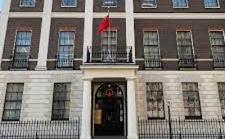
Xi Jinping’s concept of the ‘two integrations’
Keith Bennett’s speech was delivered on behalf of Friends of Socialist China at a lunch and round table discussion organised by the Chinese Embassy in London for representatives of fraternal parties and other British friends of China to celebrate the Lunar New Year and to explore the topic of building a shared future for humanity.
The following report on the event was published on the website of Friends of Socialist China:
On February 21, the Chinese Embassy in London organised a lunch and round table discussion for representatives of fraternal parties and other British friends of China to celebrate the Lunar New Year and to explore the topic of building a shared future for humanity along with the other major themes raised at the Central Conference on Work Related to Foreign Affairs, held in Beijing last December.
In his keynote report, Ambassador Zheng Zeguang first dealt with economic developments. China’s economy, he noted, had become greener, the middle income group had already reached 400 million, and Premier Li Qiang has noted that it will reach 800 million in five years. There were intensified efforts to sort out the problems in the real estate market.
On foreign policy, the Ambassador laid particular stress on high quality Belt and Road (BRI) developments, the historic reconciliation between Iran and Saudi Arabia, brokered by China, China’s contribution to the UAE consensus on climate change reached at COP 28, along with China’s role in the Global South, championing the expansion of the BRICS cooperation mechanism and the African Union’s admission to the G-20.
China’s policy, he explained, was to promote peace and oppose war. Without peace there could be no development and peace can only be possible if the independence and territorial integrity of nations was defended. It was further necessary to uphold mutual learning and to oppose ideas of a clash of civilisations.
Friends of Socialist China was represented by our co-editor Keith Bennett along with committee member Dr. Ali Al-Assam. In his contribution, Keith laid stress on how President Xi’s concept of a community with a shared future for humanity, which is described as the core tenet of Xi Jinping Thought on Diplomacy, embodies Xi’s concept of the “two integrations”, namely the integration of Marxism with China’s specific realities and especially the best of its traditional culture.
Other speeches were made by Robert Griffiths, General Secretary of the Communist Party of Britain (CPB); Andy Brooks, General Secretary of the New Communist Party of Britain (NCP); Christina Kostoula, Vice Chair of the Communist Party of Great Britain (Marxist-Leninist) (CPGBML); Wang Qi, Minister of the Chinese Embassy; Stephen Perry, Honorary President of the 48 Group Club; Right Honourable Lord Davidson KC of Glen Cova, Labour Member of the House of Lords; Martin Albrow, Fellow of Britain’s Academy of Social Sciences; Martin Jacques, author of the best selling ‘When China rules the world’; Sam Daws, Director of the Project on UN Governance and Reform at the Centre for International Studies, University of Oxford; and Hugh Goodacre, Secretary of the Xi Jinping Thought Study Group of the Institute for Independence Studies.
Further contributions were made in discussion by Roger McKenzie, Foreign Editor of the Morning Star; and Ali Al-Assam of Friends of Socialist China.
Contact Us
- The Institute's academic programme
Academic committees, exchanges, grants.
- The Institute's principles
Statement of Principles and other documentation.
- Study of the Juche Idea
The Juche Idea Study Group: its history, seminars, publications and other documentation.
- Study of Xi Jinping Thought
Publications and activities of the Xi Jinping Thought Study Group.
